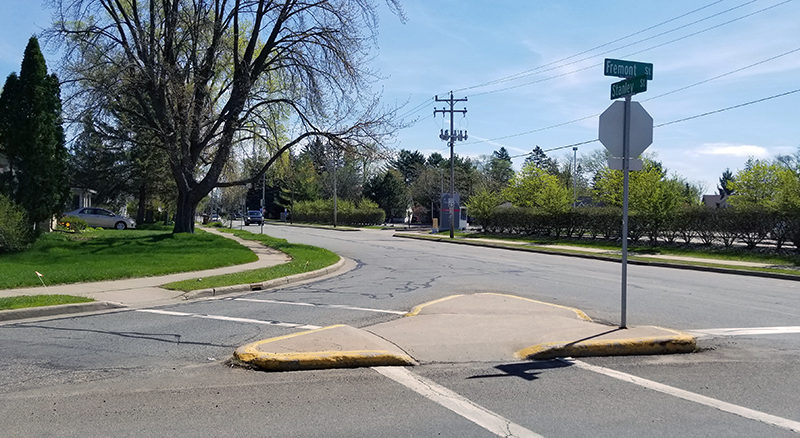Over budget, council approves Stanley restripe
By Brandi Makuski
Following more than an hour of discussion on Sept. 17, the Stevens Point City Council on voted 7-3 to approve a $97,000 restriping project on Stanley St.
The project originally was budgeted at $60,000 and could kick off in a matter of weeks, according to Public Works Director Scott Beduhn, who said his office’s next step is putting together a formal contract to work with Pewaukee-based Century Fence, the sole company to return a bid on the project.
Once the contract is signed, Beduhn said, work can begin without additional consideration by the council. Project costs that exceed the city’s allocation for the project would come from the city’s roadway maintenance budget for 2018, Beduhn said.
Beduhn introduced options on Monday not previously considered for the restriping project, to include the possibility of city crews conducting the work themselves using latex paint—which he said could cost as little as $1,500—borrowing the equipment from the Portage Co. Highway Department, or purchasing the equipment to do the work themselves at an estimated cost of $50,000. Mayor Mike Wiza called the latter option “intriguing”.
When asked by Alderman Mike Phillips why the options weren’t presented earlier, Wiza said the council never asked for them, adding a majority of the council had always been very specific in its request for information on the project as it was presented by Alderman David Shorr in May.
Beduhn also said on Monday the city would likely see better cost options if it chose to rebid the project in a few months, but council members said they didn’t want to wait, with some arguing media coverage of the project has been “misleading”.
“The project was bid at $84,000. On top of that is contingency; the assumption is that contingency will not be spent,” said Councilwoman Tori Jennings, referencing the $96,900 figure that has been reported by local media, a number that includes contingency funding: money set aside for unforeseen situations that arise during construction projects.
“This project is contrary to the mountains of misinformation, in terms of how I’m referred to in this discussion,” she added. “This is economic development, a prudent investment towards that goal.”
Shorr said opponents to the project are wrong to think the council doesn’t have the city’s best interest in mind.
“We’re talking about this issue as if it’s about the money,” Shorr said. “It’s unclear to me that it’s really about the money. People are opposed to this, it’s true. This idea of ‘an agenda’ is strange to me, it’s unfortunate. I don’t know what that means.”
Community Development Director Michael Ostrowski did confirm Jennings’ remarks that the lane reduction would improve economic development, but he also took the council to task during the meeting, saying it was “unfortunate” the project didn’t take a traditional path through city department channels, as it would have better framed the discussion from the beginning by presenting data, options, and alternatives in a more professional manner.
“It’s caused a lot of division, which has created a lot of challenges,” Ostrowski said. “It’s also created a lot of negativity, which prospective businesses and residents do see. The first thing they’re going to do when they go into any community is look at what’s going on; seeing this dysfunction does not help.”
Many on the council were unmoved by Ostrowski’s remarks.
“[The road] is mostly residential; Stanley St. was overbuilt years ago,” said Councilwoman Mary McComb of District 9. “Restriping it could return it to a fully-functional roadway instead of [being] highway-ish, like it is now. I think it’s an investment in a future Stevens Point, one that invites visitors in, that makes that neighborhood more attractive, and that helps the economy.”
District 8 Councilwoman Cathy Dugan said she’s received a number of calls from constituents arguing four lanes were necessary along the roadway, but she doesn’t agree.
“My answer to that is not necessarily that we need it [the road] be neighborhood-friendly, but one of the reasons it’s different now than when I was a kid, is that we have many more commuters now,” Dugan said. “Nonetheless, they’re speeding, we don’t have enough police staff to catch them all.”
Dugan agreed the project took an unusual path to implementation but said it was “wonderful” the council took initiative on the project, adding, “I liked being apart of that.”
Not everyone on the council was as excited.
“This corridor is a main corridor coming into our city; it’s not a city neighborhood street,” said Alderman Jeremy Slowinski. “Even though there are houses on it, it has to move traffic, it’s a main artery. There’s going to be congestion, and people are going to start taking side streets. We’re basically just diverting traffic. And we’re not even addressing pedestrians being able to cross the street. We’re spending more money than we budgeted for and we’re not even solving the problem.”
Councilman Mike Phillips said the project was contrary to the council’s job of being fiscally responsible.
“Part of our job is to be a steward of taxpayer dollars,” said Phillips, a longtime alderman for District 10. “Some of you are running for reelection next year; I hope you all understand that this is a pretty hot topic. If you think the people aren’t looking at how you spend tax dollars, you’re wrong. You remember this.”
Only two members of the public were in attendance to speak on the issue. Trevor Roark, who chairs the city’s bicycle and pedestrian street safety commission, spoke in favor of the restriping project, saying it was an improvement for bicycle safety and economic development in the city.
Resident Dave Wysocki was in opposition, arguing the move was unnecessary and that he was concerned about the high cost of the project.
“You need to really consider who it is you represent,” Wysocki said.
Council members Jennings, Shorr, Mary Kneebone, Dugan, Meleesa Johnson, Cindy Nebel, and McComb all voted in favor. Slowinski, Phillips, and Shaun Morrow voted against the measure. Councilwoman Heidi Oberstadt was absent.
When asked whether he plans to veto the council vote, Wiza on Tuesday said he was still considering all of the information. Under state law, Wiza has five days to sign a veto if he chooses to do so.





